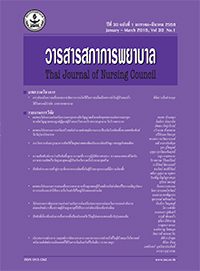การประเมินความเสี่ยงและการจัดการการเกิดไข้ในภาวะเม็ดเลือดขาวต่ำ ในผู้ป่วยมะเร็งได้รับยาเคมีบำบัด : บทบาทพยาบาล
Keywords:
cancer patient, chemotherapy, febrile neutropenia, role of nurse, risk assessment, management, ผู้ป่วยมะเร็ง, ยาเคมีบำบัด, การเกิดไข้ในภาวะเม็ดเลือดขาวต่ำ, บทบาทพยาบาล, การประเมินความเสี่ยงและการจัดการAbstract
การเกิดไข้ในภาวะเม็ดเลือดขาวต่ำเป็นภาวะแทรกซ้อนที่พบได้บ่อยในผู้ป่วย มะเร็งที่รักษาด้วยยาเคมีบำบัด เป็นภาวะที่มีความรุนแรงและอาจส่งผลเสียต่อผลลัพธ์การรักษาหลายประการ เช่น เพิ่มความเสี่ยงต่อการติดเชื้อ ทำให้วงรอบของการให้ยาเคมีบำบัดล่าช้าออกไป ลดประสิทธิผลของยาเคมีบำบัด เพิ่มอัตราวันนอนโรงพยาบาลนานมากขึ้น เพิ่มการใช้ยาปฏิชีวนะ เพิ่มค่ารักษาพยาบาลสูงขึ้นและที่สำคัญที่สุดคือทำให้อัตราการเสียชีวิตสูง ขึ้นในผู้ป่วยมะเร็งหลายชนิด การประเมินความเสี่ยงการเกิดไข้ในภาวะเม็ดเลือดขาวต่ำและการจัดการทางการ พยาบาลที่มีประสิทธิภาพมีความสำคัญอย่างยิ่งในการดูแลผู้ป่วยมะเร็งที่ได้ รับยาเคมีบำบัด บทบาทของพยาบาลที่สำคัญ ได้แก่ 1) การประเมินความเสี่ยงต่อการเกิดไข้ในภาวะเม็ดเลือดขาวต่ำอย่างแม่นยำและรวด เร็วในผู้ป่วยมะเร็งที่ได้รับยาเคมีบำบัดทุกราย ในผู้ป่วยกลุ่มเสี่ยงควรได้รับยา granulocyte colony-stimulating factors: G-CSF เพื่อป้องกันการเกิดไข้ในภาวะเม็ดเลือดขาวต่ำพยาบาลจึงควรมีความรู้และเข้า ใจเกี่ยวกับแบบประเมินความเสี่ยงต่อการเกิดภาวะไข้ในภาวะเม็ดเลือดขาว ต่ำเพื่อสามารถนำมาใช้คัดกรองผู้ป่วยได้อย่างมีประสิทธิภาพ และ 2) การดูแลจัดการผู้ป่วยกลุ่มเสี่ยงอย่างเหมาะสม โดยเน้นด้านการให้ความรู้และคำแนะนำการปฏิบัติตัวแก่ผู้ป่วยเพื่อลดโอกาสติด เชื้อ ได้แก่ ด้านอาหาร สุขอนามัยส่วนบุคคล และการจัดการด้านสิ่งแวดล้อมเมื่อกลับไปดูแลตนเองที่บ้านเพื่อส่งเสริมให้ ผู้ป่วยมีพฤติกรรมการดูแลตนเองที่ดี ป้องกันและลดอันตรายจากการเกิดไข้ในภาวะเม็ดเลือดขาวต่ำ
Abstract: Febrile Neutropenia (FN), a common complication in cancer patients undergoing chemotherapy, could have a number of serious effects on the treatment. In patients suffering from many types of cancer, it may lead to delayed chemotherapy cycles, reduced dosage and efficacy of chemotherapy, increased periods of hospitalisation, need for broad-spectrum antibiotics, increased medical expenses and, most seriously, increased mortality rates.
Assessment of febrile neutropenia risks and efficient nursing management are vital to the process of caring for cancer patients undergoing chemotherapy. There are two major roles that nurses assigned to take care of such patients are required to play. First, the nurses are required to perform quick and accurate assessment of febrile neutropenia risks in every cancer patient undergoing chemotherapy. It is advisable that patients in the risk group be given granulocyte colony-stimulating factors (G-CSF) as a prevention of febrile neutropenia. For this reason, oncology nurses are supposed to possess accurate knowledge and understanding of the process of febrile neutropenia risk assessment, which increases patient-screening efficiency. Second, the nurses are required to provide proper care for the patients, with emphasis on educating and advising them on reduction of infection risk. Such advice could focus on food choices, personal hygiene, and environmental management during convalescence (after discharge). These two roles, which enable the patients to improve their self-care behaviour, can lead to the prevention of febrile neutropenia and mitigation of its danger.








